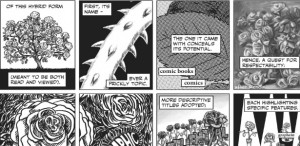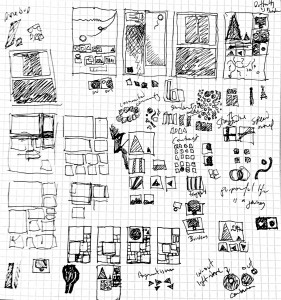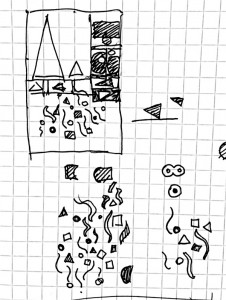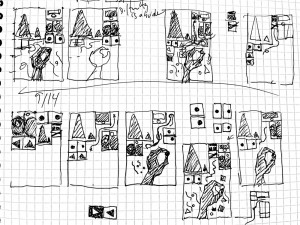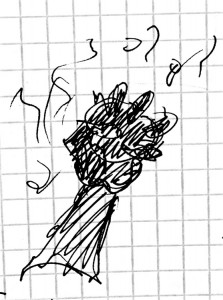On this post, excited to share a roundup of new reviews and interviews, a video conversation, plus more process sketches.
First up, I was interviewed in great depth by Tim Hodler for The Paris Review. Hodler’s questioning took the conversation in a number of directions I don’t normally go, and I greatly appreciated the opportunity. An excerpt:
[In regards to my newborn daughter learning to control her fingers.] “That experience of seeing new is something I wanted Unflattening to remind us of. Obviously, this could be a problem—if you had to figure out how your hands work each day, you couldn’t do anything. But if you can find ways to keep your eyes open in that same way, while retaining the experience of knowing how to use your hands and not having to learn that all over again—that’s what I wanted to get at. To see new, but acknowledge that we have experience and it’s necessary to have experience in order to do something. You want your children to be very “unflat,” to recognize the circumstances they are born into and that they acquire but also able to see with open eyes so as to make their own way.” Read in its entirety here.
Comics for Grownups Podcast Episode 48 featured an absolutely brilliant and rich discussion of Unflattening by Alexander Rothman and Joshua Malbin. One of the really astute observations Rothman made, spoke to conception and perception being two sides of the same coin, and Malbin brought up how my early chapters seem to be teaching the reader how to find their way into the work – which was quite intentional. Really pleased to have this kind of insight into my own work. Listen to the Comics for Grownups Podcast here.
I did a long form interview with UK comics critic Colin Smith for his Too Busy Thinking about Comics site. A sweeping conversation about process, constraints, and more, I really enjoyed and am grateful for the opportunity. A little excerpt from his introduction in which he describes it as:
A celebration of comics’ ability to bring complex and challenging ideas to life, Unflattening finds its writer/artist in joyfully innovative form. … Whether he’s playfully expressing how dogs perceive the world or evoking the soul-quashing brutality of tyrannical regimes, Sousanis’ pages are ingenious, involving and inspiring. Put simply, Unflattening is smart, heatfelt fun. Reading it reminded me of the bliss it was height of the mid-80s, when so many new paths in the sequential arts were being pioneered. … Yet the typically enthusiastic press that the book has earned might not always give quite that impression. Fun in its most general sense is rarely mentioned. Although Sousanis’ visual storytelling has rightly been highly praised, it’s often in the context of scholastic conversations about education, perception, academia and so on. All of these discussions have been entirely relevant; Unflattening began as a doctoral dissertation and its content is appropriately rigorous and knowledgeable. But for all of that, the book is essentially an effervescent and entirely accessible paean to the oft-underestimated potential of the comicbook. As such, Unflattening holds considerable charms for the reader who might care little for this or that philosophical implication. The sheer fun of it all is something that I fear might get lost in the otherwise welcome chorus of learned approval. In short, Unflattening isn’t an experience whose appeal and value in any way stops on either side of the academy’s gates.
Read the interview with Colin in full, Part One here and Part Two here.



